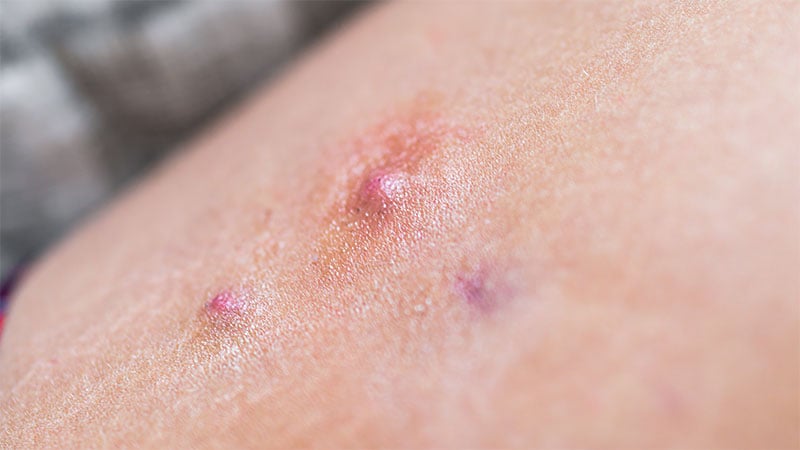New Insight Into Epileptic Seizures Triggered by Music New Insight Into Epileptic Seizures Triggered by Music
May 1, 2025Oral, Injected Semaglutide May Pose Distinct Eye Risks Oral, Injected Semaglutide May Pose Distinct Eye Risks
May 1, 2025
TOPLINE:
Individuals with hidradenitis suppurativa had a significantly higher prevalence of psychiatric diseases, including depression, anxiety, bipolar disorder (BD), schizophrenia, substance use disorder (SUD), and suicide, than the general population. The findings indicated a need to raise awareness of psychiatric illnesses in those with hidradenitis suppurativa.
METHODOLOGY:
- Researchers conducted a systematic review and meta-analysis to evaluate the prevalence and association between hidradenitis suppurativa and psychiatric diseases.
- The analysis included a total of 83 studies, of which 76 were included in the quantitative analysis.
- Psychiatric diseases were diagnosed by physicians in 44 studies, assessed using questionnaires in 30 studies, and both diagnosed by physicians and assessed using questionnaires in 10 studies.
TAKEAWAY:
- Patients with hidradenitis suppurativa showed a higher prevalence of depression (20.9% vs 8.35%; odds ratio [OR], 2.06; P < .0001) and anxiety (19.3% vs 8.14%; OR, 1.91; P < .0001) than the general population.
- Moreover, they had a higher risk for BD (1.04% vs 0.06%; OR, 3.68; P = .0332), schizophrenia (2.68% vs 1.23%; OR, 2.00; P = .007), SUD (6.02% vs 3.12%; OR, 3.58; P < .0001), alcohol abuse (3.97% vs 1.84%; OR, 1.88; P = .0571), and suicide (0.67% vs 0.44%; OR, 1.56; P = .0054) than the general population.
- The pooled prevalence of depression increased with increasing Hurley stage (stage I, 19.5%; II, 20.9%; and III, 35.3%; P < .0001). The pooled prevalence of depression and anxiety was lower for physician-diagnosed psychiatric disease (18.6% and 16.5%, respectively) than for questionnaire-assessed psychiatric disease (26.2% and 27.9%, respectively).
- Psychiatric diseases were more prevalent in female patients with hidradenitis suppurativa than in male patients with hidradenitis suppurativa (28.0% vs 21.1%), with female patients having the highest pooled prevalence of depression (22.8% vs 15.2%), anxiety (14.9% vs 8.46%), BD (1.98% vs 1.02%), and attention-deficit/hyperactivity disorder (1.84% vs 0.51%).
IN PRACTICE:
“In conclusion, this study found a significantly higher risk of different PDs [psychiatric diseases] in patients with HS [hidradenitis suppurativa] compared to the general population including depression, anxiety, BD, schizophrenia, psychosis, SUD, alcohol abuse, ADHD [attention-deficit/hyperactivity disorder], personality disorder, and suicide with a GRADE rank of moderate to high certainty. These findings emphasise the need for an integrated approach to address physical and mental aspects of HS. Further, our findings reflect a need to raise awareness of psychiatric illness in patients with HS,” the authors wrote.
SOURCE:
This study was led by Caroline L. Folkmann, Department of Dermatology and Venereology, Bispebjerg Hospital, Copenhagen, Denmark. It was published online on April 19, 2025, in the British Journal of Dermatology.
LIMITATIONS:
This study included a large number of subgroup analyses, which increased the risk for type 1 errors. The use of crude estimates for meta-analysis potentially led to an overestimation of associations. Language bias may have been introduced by including only English and Danish studies. Assessment methods for psychiatric diseases varied between studies, affecting the interpretation of the results, with questionnaire-based assessments showing higher prevalence rates than physician assessments.
DISCLOSURES:
This study did not receive any specific grant from funding agencies in the public, commercial, or not-for-profit sectors. Six authors reported having no conflicts of interest. The other authors reported receiving consultancy honoraria and research funding and having other ties with various sources.
This article was created using several editorial tools, including AI, as part of the process. Human editors reviewed this content before publication.
